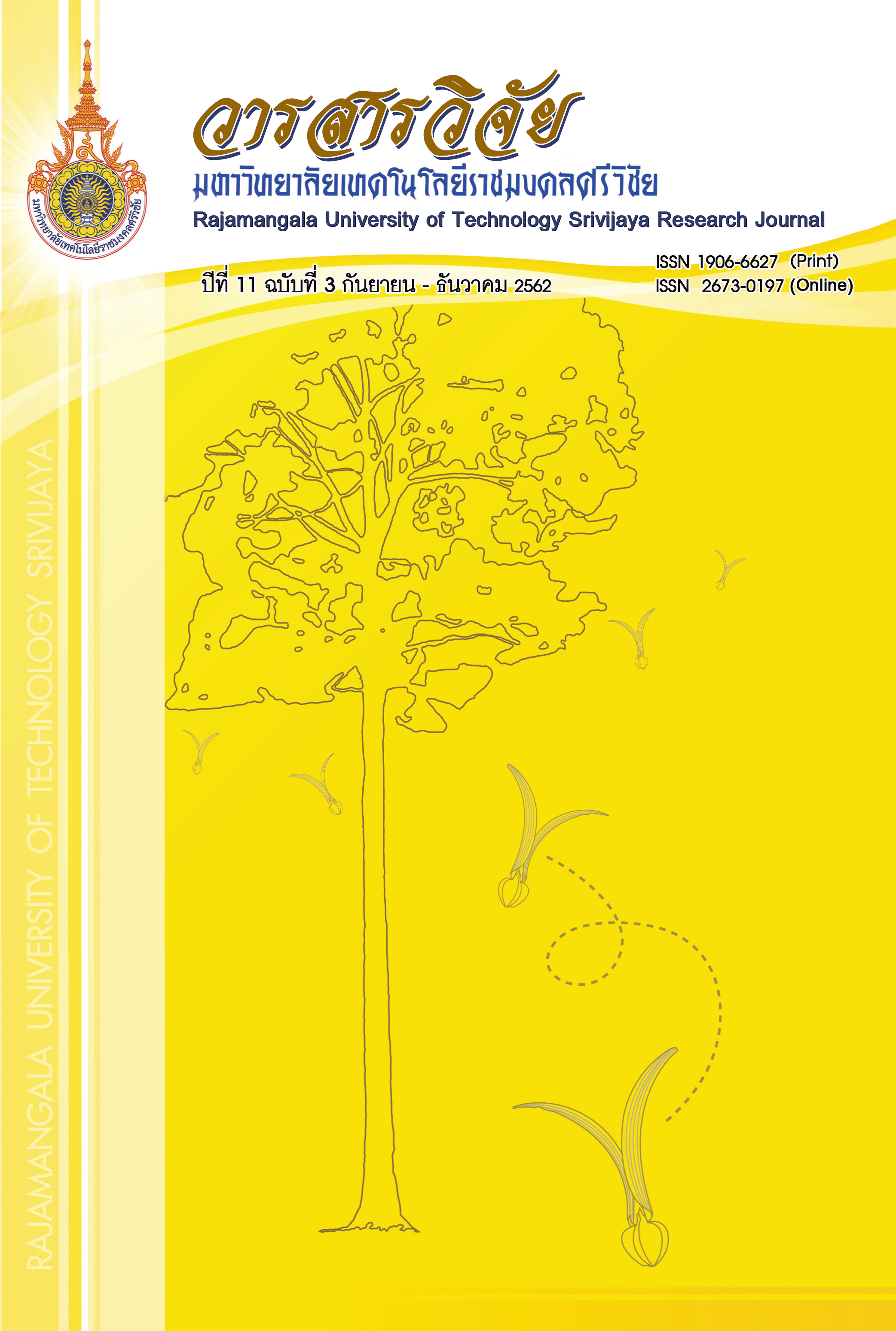Community-based Tourism Management in Trang, Satun and Krabi Provinces
Keywords:
Community-based Tourism Management, Trang Province, Satun Province, Krabi ProvinceAbstract
This study aimed to 1) investigate community-based tourism management in Trang, Satun and Krabi Provinces regarding Thailand Community-based Tourism Development Criteria, and 2) explore guidelines for developing sustainable community-based tourism management in Trang, Satun and Krabi Province. The study employed qualitative research. One sample group of 18 representatives from model community-based tourism groups in Trang, Satun and Krabi Province participated in the study. They were selected based on a purposive sampling method. The data was collected by observation, in-depth interview, and focus group. The data was categorized, compared, and summarized to connect related theories.
The resulted revealed as follows: 1) Community-based tourism management in Trang, Satun and Krabi Province meets the Thailand Community-based Tourism Development Criteria for all five aspects which are 1) Community-based Tourism Management, 2) Economic, Society and Good Quality of Life, 3) Local Cultural Heritage Conservation and Promotion, 4) Systemic and Sustainable Natural Resources and Environment, and 5) Community-based Tourism Service Quality. 2) The concept of community-based tourism development was used as a guideline to improve the capacity of community-based tourism in Trang, Satun and Krabi Province. They are 1) Developing Partnerships, 2) Adopting an Integrated Approach, 3) Planning and Designing Quality Products, 4) Identifying Market Demand and Developing Marketing Strategy, and 5) Implementing and Monitoring Performance. These aimed at helping the community gain advantages from mass tourism as well as preserving identity and resources of the community.
References
กระทรวงการท่องเที่ยวและกีฬา. 2558. ยุทธศาสตร์การท่องเที่ยวไทย พ.ศ. 2558-2560. แหล่งที่มา: https://www.mots.go.th/ewt_dl_link.php?nid=7114, 20 สิงหาคม 2561.
การท่องเที่ยวแห่งประเทศไทย. 2561. การท่องเที่ยวโดยชุมชมอย่างยั่งยืน. แหล่งที่มา: https://www.tatreviewmagazine.com/article/cbt-thailand/, 20 สิงหาคม 2561.
คณะกรรมการนโยบายการท่องเที่ยวแห่งชาติ. 2559. เกณฑ์การพัฒนาการท่องเที่ยวโดยชุมชนของประเทศไทย. แหล่งที่มา: https://data.go.th/DatasetDetail.aspx?id=db41976b-78b5-4c3d-b13d-223414de8c2b, 20
สิงหาคม 2561.
บุญเลิศ จิตตั้งวัฒนา และ เพ็ญศิริ ศรีอำภา. 2557. การพัฒนาการท่องเที่ยวแบบยั่งยืน. ธรรมสาร, นนทบุรี.
เบญจา ยอดดำเนิน-แอ็ตติกจ์ และ กาญจนา ตั้งชลทิพย์. 2552. การวิเคราะห์ข้อมูลเชิงคุณภาพ: การจัดการข้อมูลการตีความ และการหาความหมาย. ชีโน่ พับลิชชิ่ง, กรุงเทพฯ.
พิมพ์ระวี โรจน์รุ่งสัตย์. 2553. การท่องเที่ยวชุมชน. โอเดียนสโตร์, กรุงเทพฯ.
พจนา สวนศรี และ สมภพ ยี่จอหอ. 2556. คู่มือมาตรฐานการท่องเที่ยวโดยชุมชน. สถาบันการท่องเที่ยวโดยชุมชน มหาวิทยาลัยพายัพ, หจก. วนิดาการพิมพ์, เชียงใหม่.
วรรณดี สุทธินรากร. 2556. การวิจัยเชิงคุณภาพ การวิจัยในกระบวนทัศน์ทางเลือก. สยามปริทัศน์, กรุงเทพฯ.
ศุภวรรษ เชื้อเมืองพาน, ปารณีย์ เผ่าภูธร, สังคม แสนบุตรดี และ จักรพงษ์ พวงงามชื่น. 2556. การศึกษาเพื่อพัฒนาศักยภาพการท่องเที่ยวโดยชุมชน กรณีศึกษาบ้านไร่กองขิง ตำบาลหนองความ อำเภอหางดง จังหวัดเชียงใหม่. วารสารแก่นเกษตร มหาวิทยาลัยขอนแก่น 41(1): 678-684.
สำนักงานการท่องเที่ยวและกีฬาจังหวัดภูเก็ต. 2560. โครงการพัฒนาศักยภาพเครือข่ายการท่องเที่ยวโดยชุมชน (CBT) เขตพัฒนาการท่องเที่ยวอันดามัน. แหล่งที่มา: https:// phuket.mots.go.th/ewt_dl_link.php?nid=395 fbclid=IwAR1kSqG1P2XsVnw96mhDQz019 -f9QV9eWyv8I4bcrqaI51gy8EAEmLdvwko, 20 สิงหาคม 2561.
องค์อาจ นัยพัฒน์. 2551. วิธีวิทยาการวิจัยเชิงปริมาณและเชิงคุณภาพทางพฤติกรรมศาสตร์และสังคมศาสตร์. ห้างหุ้นส่วนจำกัด สามลดา, กรุงเทพฯ.
Hamzah, A., Khalifah, Z., Ismail, H.N., Baharudin, N.H., Bhaskaran, L. and Nooruddin, R. 2009. Handbook on Community Based Tourism “How to Develop and Sustain CBT”. Asia-Pacific Economic Cooperation Secretariat, Kuala Lumpur, Malaysia.
Sriupayo, S. 2017. Community Based Tourism in Sustainable Dimension, Case study: Baan Muanggluang Community Kaper District Ranong Province, pp. 67-69. In Academics World 74th International Conference. Oslo, Norway.
Downloads
Published
How to Cite
Issue
Section
License
The content and information in the article published in Journal of Rajamangala University of Technology Srivijaya It is the opinion and responsibility of the author of the article. The editorial journals do not need to agree. Or share any responsibility.







